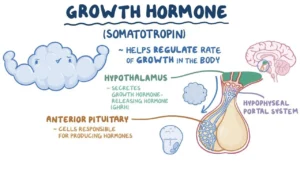We all know that stress is bad for us. It can cause all sorts of health problems, and make us feel terrible both physically and mentally. But what many people don’t know is that stress hormones are to blame for a lot of these negative effects. In this blog post, we will discuss the role that stress hormones play in our bodies and minds, and how they can lead to health problems and mental disorders. We will also offer some tips on how to reduce stress levels and keep these harmful hormones under control!
Contents
Defining Stress Hormones
 Stress hormones are chemicals that are released in response to stress. The three main stress hormones are cortisol, adrenaline, and norepinephrine. There are also several other hormones that are released in smaller amounts. These include glucagon, epinephrine, and growth hormone.
Stress hormones are chemicals that are released in response to stress. The three main stress hormones are cortisol, adrenaline, and norepinephrine. There are also several other hormones that are released in smaller amounts. These include glucagon, epinephrine, and growth hormone.
These are produced by the adrenal glands, which are located on top of the kidneys. The release of stress hormones is controlled by the hypothalamus, a small region in the brain that regulates many of our body’s functions. We will understand the functions of all of these.
Cortisol
Most popular by the name of “the stress hormone”, cortisol is a glucocorticoid hormone that is produced by the adrenal gland. It is released in response to physical or psychological stress. Cortisol has many functions, including regulating blood sugar levels, suppressing the immune system, and reducing inflammation. It also plays a role in memory formation and learning.
Cortisol is often referred to as the “fight-or-flight” hormone because it helps us to deal with stressful situations. It does this by increasing blood sugar levels, so that we have more energy to fight or flee. Cortisol also increases our heart rate and blood pressure, and makes us breathe faster. These physical changes allow us to deal with the perceived threat.
However, when cortisol is released in response to non-threatening situations, or when it is constantly activated, it can lead to health problems. For example, chronic stress can cause high blood pressure, heart disease, diabetes, and obesity. It can also weaken the immune system and lead to anxiety and depression.
Adrenaline
 Adrenaline is another hormone that is released in response to stress. It is also known as epinephrine. Adrenaline is a catecholamine hormone that is produced by the adrenal gland. Like cortisol, it is released in response to physical or psychological stress.
Adrenaline is another hormone that is released in response to stress. It is also known as epinephrine. Adrenaline is a catecholamine hormone that is produced by the adrenal gland. Like cortisol, it is released in response to physical or psychological stress.
Typically, there is something known as “adrenaline rush”, which is an intense burst of energy and heightened senses. It prepares our body by increasing heart rate, blood pressure, and respiration. It also increases blood sugar levels and slows digestion. Adrenaline also sharpens our senses and gives us more strength and energy.
Adrenaline can have both positive effects on the body. In small doses, it can improve mental alertness, increase physical energy, and make you more focused.
In a lot of ways, adrenaline and cortisol work together to help us deal with stress. However, adrenaline is more short-lived than cortisol. Once the threat has passed, adrenaline levels will return to normal. However, if we are constantly under stress, our adrenal glands can become fatigued and unable to produce enough adrenaline. This can lead to anxiety, irritability, and even depression.
Norepinephrine
Norepinephrine is another hormone that is released in response to stress. It is also known as noradrenaline. Norepinephrine is released by the adrenal glands and is a part of the sympathetic nervous system. Norepinephrine affects both the body and mind. In the body, norepinephrine increases heart rate and blood pressure. It also increases blood sugar levels. In the mind, norepinephrine affects mood and can cause anxiety.
Moreover, norepinephrine affects how we deal with stress. It can improve our ability to deal with short-term stress, but it can also make us more sensitive to long-term stress.
Glucagon
Glucgaon is another stress hormone that works in the opposite way of insulin. Glucagon is released when blood sugar levels are low, and it signals the liver to release stored glucose into the bloodstream. This provides a quick burst of energy that can be used to deal with a stressful situation.
Alongside the sugar rush, glucagon also increases heart rate and blood pressure, which can further contribute to the feeling of being ‘stressed out’. This can be due to the fact that glucagon is released during periods of fasting or when blood sugar levels drop too low.
Growth hormone
 Lastly, growth hormones are released during periods of stress. Growth hormone is responsible for cell growth and regeneration, as well as metabolism. It’s release is triggered by the hypothalamus, and it works in conjunction with cortisol to help the body deal with stress.
Lastly, growth hormones are released during periods of stress. Growth hormone is responsible for cell growth and regeneration, as well as metabolism. It’s release is triggered by the hypothalamus, and it works in conjunction with cortisol to help the body deal with stress.
Growth hormone also helps to repair tissue damage and is essential for wound healing. It’s release is increased during periods of physical or emotional stress, as the body needs to repair any damage that has been done.
In the context of stress, growth hormone is essential for the body to be able to repair any damage that has been done.
So, there you have it. These are the three main stress hormones and how they affect your body. While they can all be helpful in small doses, it’s important to remember that too much of a good thing can be harmful. Now that you know a little bit more about them, you can start to understand why you may feel the way you do during periods of stress. And hopefully, this knowledge will help you to find ways to better cope with stress in your life.
Effects Of Stress Hormones
As mentioned above, these hormones serve an array of functions in the human body. In small doses, they can be beneficial, but when produced in large amounts, they can have negative effects. Some of the most common effects of stress hormones include:
- Increased heart rate
- High blood pressure
- Restlessness
- Irritability
- Brain fog
- Fatigue
- Difficulty concentrating
- Muscle tension
- Headaches
- Upset stomach
If left unmanaged, these can consequent in severe disorders and illnesses such as:
- Hypertension
- Coronary heart disease
- Type II diabetes
- Adrenal fatigue
- Obesity
- Eating disorders
- Post-traumatic stress disorder (PTSD)
- Obsessive-compulsive disorder (OCD)
- Anxiety disorders
- Depression
- Autoimmune diseases such as lupus and rheumatoid arthritis.
If you are constantly under stress, your body will produce more of these hormones, which can lead to the above-mentioned effects. It’s important to find ways to manage stress in your life in order to avoid these negative effects.
Ways To Deal With Stress Hormones
If you feel like you are constantly under stress, there are things you can do to help your body cope. It is first important to identify if and how your hormonal levels may be out of balance. This can happen through a simple blood test with your doctor.
Once you have a better understanding of your hormone levels, you can start to make lifestyle changes that will help to reduce stress and rebalance your hormones. Some things you can do include:

- Exercise: Exercise is one of the best ways to reduce stress. It helps to release endorphins, which have mood-boosting effects. It also helps to improve sleep quality, which can further reduce stress levels.
- Yoga: Yoga is a great way to reduce stress and promote relaxation. It involves gentle stretching, deep breathing, and mindfulness. These activities help to calm the mind and body, and can be very effective in reducing stress hormone levels.
- Meditation: Meditation is another great way to reduce stress. It helps to clear the mind and focus on the present moment. This can help to lower cortisol levels and promote a sense of calmness.
- Get enough sleep: Sleep is essential for the body to recover from stress. When you don’t get enough sleep, your body produces more cortisol. This can lead to a vicious cycle of stress and fatigue. Make sure to get at least seven hours of sleep each night.
- Eat a healthy diet: Eating a balanced diet helps to reduce stress by providing the body with the nutrients it needs to function properly. Avoid processed foods and make sure to include plenty of fresh fruits, vegetables, and whole grains in your diet.
- Practice self-care: Make sure to take time for yourself each day. This can be something as simple as taking a hot bath or reading your favorite book. Taking care of yourself is essential for managing stress.
- Reduce caffeine intake: Caffeine can increase cortisol levels and make stress worse. If you are feeling stressed, try to limit your caffeine intake or cut it out altogether.
- Manage your time: Time management is key when it comes to reducing stress. If you feel like you are constantly juggling too many things, it may be time to reevaluate your schedule. Try to prioritize and simplify your to-do list.
- Cut back on alcohol: Alcohol can worsen stress levels and lead to other health problems. If you drink alcohol, try to limit your intake or cut it out altogether.
- See a therapist: If you are struggling to cope with stress, it may be helpful to see a therapist. A therapist can help you understand and manage your stressors. They can be helpful in coming up with appropriate coping mechanisms for the same.
- Consider medication: If lifestyle changes alone are not enough to reduce stress, medication may be an option. There are several types of medication that can help to manage stress and anxiety. Speak with your doctor to see if medication is right for you.
These are just a few of the ways you can help to reduce stress in your life. Remember, it is important to find what works for you. Everyone is different and there is no one-size-fits-all approach to managing stress. If you are feeling overwhelmed, speak with your doctor or a mental health professional for help.
Conclusion
Conclusively, we can see that stress hormones can have a negative impact on our health. It is important to find ways to manage stress in order to avoid these effects. There are many different ways to reduce stress, so find what works for you and stick with it.
If you or someone you know is looking for psychological help, Therapy Mantra is here for you. We are the leading providers of online therapy and counseling. Our team of highly trained and experienced therapists can provide assistance at the most affordable rates. Contact us today to learn more about our services. You may also visit our website to book an online therapy session or download our free Android or iOS app for more information.


